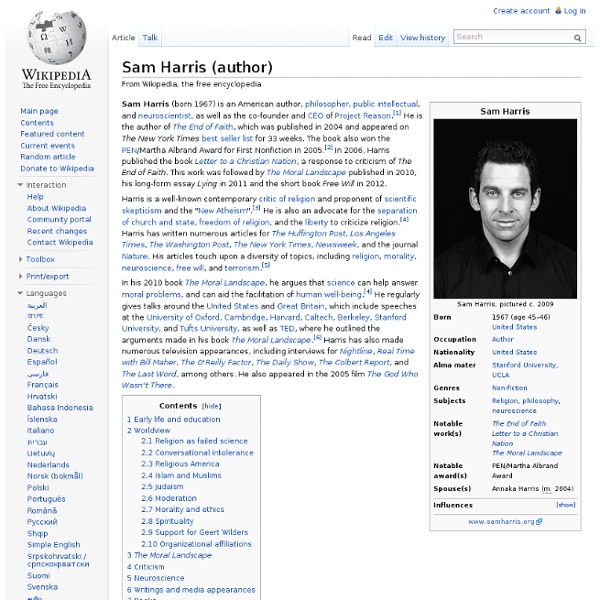Richard Dawkins
English ethologist, evolutionary biologist, and author Richard Dawkins FRS FRSL (born Clinton Richard Dawkins; 26 March 1941)[24] is a British ethologist, evolutionary biologist, and author. He is an emeritus fellow of New College, Oxford, and was the University of Oxford's Professor for Public Understanding of Science from 1995 until 2008. Dawkins first came to prominence with his 1976 book The Selfish Gene, which popularised the gene-centred view of evolution and introduced the term meme. Dawkins is known as an outspoken atheist. Dawkins has been awarded academic and writing awards, and he makes television, radio, and Internet appearances, predominantly discussing his books, atheism, and his ideas and opinions as a public intellectual.[26] Background[edit] Early life[edit] Education[edit] Teaching[edit] In 2011, Dawkins joined the professoriate of the New College of the Humanities, a private university in London established by A. Work[edit] Evolutionary biology[edit] Fathering the meme[edit]
Project Reason
History[edit] The project will draw on the talents of prominent and creative thinkers from a wide range of disciplines — science, law, literature, entertainment, information technology, etc. — to encourage critical thinking and wise public policy. It will convene conferences, produce films, sponsor scientific research and opinion polls, award grants to other non-profit organizations, and offer material support to religious dissidents and public intellectuals — with the purpose of eroding the influence of dogmatism, superstition and bigotry in the world.[4] "One immediate need", according to Sam Harris, "is to build an archive of the best secular resources on the Internet. Advisory board[edit] The project has been spearheaded by Sam and Annaka Harris[4] and has so far succeeded in attracting the following members to its advisory board: Projects[edit] See also[edit] References[edit] External links[edit] Official website
Freedom From Religion Foundation
Daniel Dennett
Daniel Clement Dennett III (born March 28, 1942)[1][2] is an American philosopher, writer, and cognitive scientist whose research centers on the philosophy of mind, philosophy of science and philosophy of biology, particularly as those fields relate to evolutionary biology and cognitive science.[3] Early life and education[edit] Dennett was born on March 28, 1942 in Boston, Massachusetts, the son of Ruth Marjorie (née Leck) and Daniel Clement Dennett, Jr.[6][7] Dennett spent part of his childhood in Lebanon, where, during World War II, his father was a covert counter-intelligence agent with the Office of Strategic Services posing as a cultural attaché to the American Embassy in Beirut.[8] When he was five, his mother took him back to Massachusetts after his father died in an unexplained plane crash.[9] Dennett says that he was first introduced to the notion of philosophy while attending summer camp at age 11, when a camp counselor said to him, "You know what you are, Daniel? First ...
TrustingDoubt
God's Emotions: Why the Biblical God is So Very Human Play 9 Part Series: What are emotions? Can an all knowing, all powerful, perfectly good God have them? What would that mean? --This series takes us into the budding field of affective science and then, fortified with a better understanding of emotions, we turn to examine traditional or orthodox Christian concepts of God. Christian Belief Through the Lens of Cognitive Science What is the mental machinery that lets us form beliefs? The more we learn bout the hardware and operating systeams of the human brain--the more we understand about human information processing--the more we glean bits of insight into the religious mind:• How does the structure of human information processing pre-dispose us to religious thinking?
Denys Turner
Denys Alan Turner (born 5 August 1942) is a British academic in the fields of philosophy and theology. He is currently Horace Tracy Pitkin Professor of Historical Theology at Yale University having been appointed in 2005, previously having been Norris-Hulse Professor of Divinity at Cambridge University. He earned his PhD in Philosophy from Oxford University. He has written widely on political theory and social theory in relation to Christian theology, as well as on Medieval thought, in particular, mystical theology. Prior to his position at Cambridge, he was Professor of Theology and Head of Department at Birmingham and has also held Head of Department at the University of Bristol. Works cited[edit] Turner has written a number of books on philosophy and theology, has contributed to dozens of others and has written a large number of articles in the course of his academic career. External links[edit] Denys Turner C.V. - Yale Univ. website
The Resignation of Eve | What If Adam's Rib is No Longer Willing To Be The Church's Backbone?
Michael Shermer
Shermer is also the producer and co-host of the 13-hour Fox Family television series Exploring the Unknown. Since April 2001, he has been a monthly columnist for Scientific American magazine with his Skeptic column. He is also a scientific advisor to the American Council on Science and Health (ACSH).[3] Shermer states he was once a fundamentalist Christian, but ceased to believe in the existence of God during his graduate studies. Early life and career[edit] Shermer grew up in Southern California.[11][12] His parents divorced when he was four[11] and later remarried, his mother to a man with three children, who became Shermer's stepsiblings, and his father to a woman with whom he had two daughters, Shermer's half-sisters. Although Shermer went to Sunday school, he says that neither his biological nor stepparents or siblings were religious nor non-religious, as they did not hold much discussion on the topic, and did not attend church nor pray together. Shermer was raised with guns.
Internet Sacred Text Archive Home



